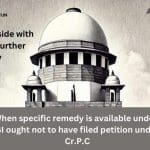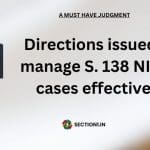Appeal against the dismissal of bail
2. This appeal arises from the judgment and order passed by the High Court of Chattisgarh at Bilaspur dated 16.02.2024 in Criminal Appeal No.1951 of 2023 by which the High Court dismissed the Criminal Appeal filed by the appellant herein (original accused) and thereby declined to release him on bail in connection with Sessions Case No.32/2020 arising from the First Information Report bearing no.9/2020 dated 24th March, 2020 registered for the offence punishable under Sections 10, 13, 17, 38(1)(2), 40, 22-A and 22-C respectively of the Unlawful Activities Prevention Act, 1967 (for short “the UAPA”), Sections 8(2), (3) and (5) of the Chhattisgarh Vishesh Jan Suraksha Adhiniyam, 2005 and Sections 120B, 201 and 149 read with 34 of the Indian Penal Code, 1860.
6. The trial is in progress. Till this date the prosecution has been able to examine 42 witnesses. The prosecution intends to examine as many as 100 witnesses. We are conscious of the Order passed by us taking the view that once the trial commences and the witnesses are being examined then in serious crimes like murder, dacoity, rape, etc, the Court ordinarily should not exercise its discretion for the purpose of grant of bail, more particularly, looking into the evidence which has come on record.
7. However, this is a case in which the appellant is in custody as an under trial prisoner since 24th March, 2020. He has no other antecedents. The panch witnesses to the recovery panchnama have also turned hostile.
8. It’s been now 5 years that he is in judicial custody. The learned counsel appearing for the State has no idea as regards the time likely to be consumed to complete the recording of the oral evidence.
10. However, many times we have made ourselves very clear that howsoever serious a crime may be the accused has a fundamental right of speedy trial as enshrined in Article 21 of the Constitution.
11. Before we close this matter, we would like to observe as to why the Public Prosecutor wants to examine 100 witnesses. Who are these 100 witnesses? We are aware that it is the public prosecutor who could be said to be in-charge of the trial and he has to decide who is to be examined and who is to be dropped. But at the same time, no useful purpose would be served if 10 witnesses are examined to establish one particular fact.
14. In this regard, the role of the Special Judge (NIA) would also assume importance. The Special Judge should inquire with the Special Public Prosecutor why he intends to examine a particular witness if such witness is going to depose the very same thing that any other witness might have deposed earlier. We may sound as if laying some guidelines, but time has come to consider this issue of delay and bail in its true and proper perspective. If an accused is to get a final verdict after incarceration of six to seven years in jail as an undertrial prisoner, then, definitely, it could be said that his right to have a speedy trial under Article 21 of the Constitution has been infringed. The stress of long trials on accused persons – who remain innocent until proven guilty – can also be significant. Accused persons are not financially compensated for what might be a lengthy period of pre-trial incarceration. They may also have lost a job or accommodation, experienced damage to personal relationships while incarcerated, and spent a considerable amount of money on legal fees. If an accused person is found not guilty, they have likely endured many months of being stigmatized and perhaps even ostracized in their community and will have to rebuild their lives with their own resources.
Judges are the masters of their courtroom
15. We would say that delays are bad for the accused and extremely bad for the victims, for Indian society and for the credibility of our justice system, which is valued. Judges are the masters of their Courtrooms and the Criminal Procedure Code provides many tools for the Judges to use in order to ensure that cases proceed efficiently.
Accused is permitted to appear through on-line on each date of hearing
17. However, we direct that the appellant shall not enter into the revenue limits of district Kanker, State of Chhattisgarh. He shall appear on-line on each date of the hearing before the trial. It is only in the last when his further statement under Section 313 of the Cr.P.C. is to be recorded, he shall personally remain present before the Trial Court. For this limited purpose, he shall enter into district Kanker.
18. We make it clear that if the appellant commits breach of the condition in any form as imposed by us, the bail shall stand automatically cancelled.
19. Pending application(s), if any, stand disposed of.
Party
Tapas Kumar Palit vs. State of Chhattisgarh – Criminal Appeal No. 738 of 2025 (Arising out of SLP(Criminal) No. 15971 of 2024) – 2025 INSC 222 – 14th February 2025.





